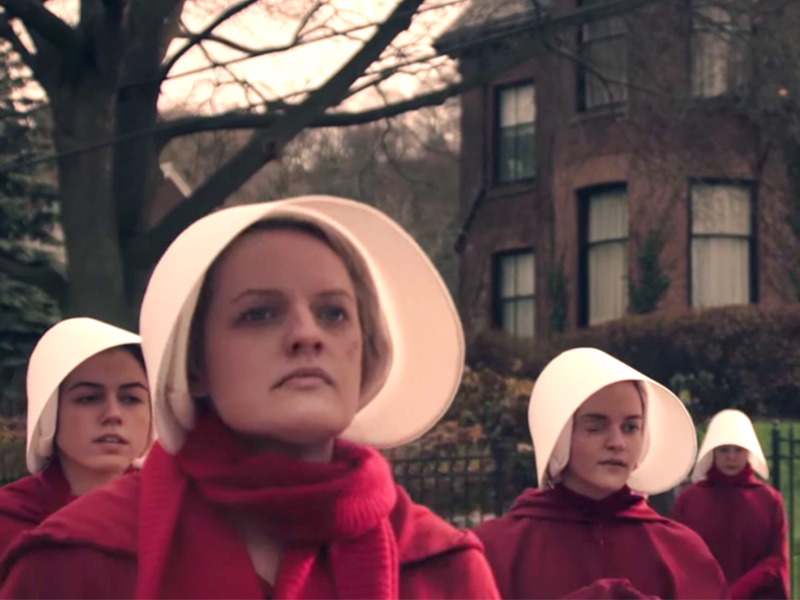(RNS) If, over the next few days, you’re looking for me, you can find me sitting in front of my TV, binge-watching “The Handmaid’s Tale,” which has just been released on Hulu.
I cannot break away.
“The Handmaid’s Tale” is an adaptation of the 1985 novel by Margaret Atwood.
It is a dystopian story, set in a near-future America.
Right-wing fundamentalists have staged a coup in the United States and have established the tyrannical, theocratic Republic of Gilead (note the biblical name).
The poisoning of the environment has resulted in a dramatic drop in fertility.
The regime has, therefore, enslaved fertile women, forcing them to become slaves within privileged households. They are the handmaids (there are other classes of oppressed women as well).
The handmaids have lost their names; instead, their names have become the patronymic of the men that they serve. So, Offred is the property “of Fred.”
Because the elite women are infertile, the handmaids must undergo a monthly impregnation ceremony with their commanders in order to bear a child for the commander and his wife.
It doesn’t take a graduate degree in political science to see “The Handmaid’s Tale” as a warning about the dangers of religious fundamentalism and totalitarian government.
Some see it as a prophetic outcry against the assault on women’s health care and the removal of women’s rights, especially at the hands of those who would do so in the name of religion – both in the United States and in Israel.
Yes, “The Handmaid’s Tale” is about fascism and misogyny.
But it is about far more than that.
“The Handmaid’s Tale” is a dark midrash (or commentary) on the patriarchal tales of Genesis.
I have been teaching Torah for almost four decades. I have edited and written several books on the Bible (consider my latest, the “JPS B’nai Mitzvah Torah Commentary,” which just came out).
And, with all that, I am embarrassed that I had not seen – in a deep way – the utter dysfunction that lies beneath the surface of the patriarchal stories.
The whole barrenness/fertility thing. The whole idea that if God favors it, God would open your womb (which is the standard greeting in “The Handmaid’s Tale” – “May God open … ”)
The whole “your wife is infertile, so use the help” thing.
In biblical times, it was legitimate to use a handmaid as a surrogate mother, particularly if the wife was infertile.
Sometimes, Genesis is clear about the pain and humiliation that this system could produce.
Sarah was angry and threatened by the presence of the nubile Hagar, pregnant with her husband’s child.
Out Hagar goes – not once, but twice.
The second time, with the kid, Ishmael.
But, sometimes the Bible is a little bit more reticent about how the participants in this domestic drama must have felt.
For example: The handmaids Bilhah and Zilpah bear children for the matriarchs Leah and Rachel.
Any word – in the Bible, midrash and classic commentaries — about how Bilhah and Zilpah must have felt about that arrangement?
If there is any, I haven’t seen it.
And, as for any shoutout to Bilhah and Zilpah in the prayer that mentions the matriarchs — zilch, or in Hebrew “efes.”
Another example: When Pharaoh’s daughter finds and adopts the infant Moses, she hires Yocheved, the biological mother of Moses, to nurse the foundling.
Anything in classical Jewish literature about how Yocheved felt at having her child torn away from her — on a daily basis?
I would welcome such comments. It would make the whole thing seem much more real.
Some years ago, Phyllis Trible wrote “Texts of Terror,” about certain biblical stories, in which women are the victims of abuse and violence.
But, really, almost every story about a biblical woman – with notable, laudable exceptions – is a text of terror.
Ever pay close attention to the reading of Esther during the raucous holiday of Purim?
It’s about how a jackass of a king, Ahasuerus, basically sexually abuses one wife, Vashti, throws her out of the palace (whatever happens to her?) and then takes a Jewish woman into his harem.
Yeah, yeah, I know what you are saying: You have to put these stories into their ancient Middle Eastern context.
I have been doing that for decades. I have read the most authoritative books by the world’s most erudite biblical scholars.
And yet, what did it take to finally open my eyes to the violence that has always existed in the white spaces between the black letters of the Torah scroll?
Right. A show on Hulu.
Because, only when I saw how the Genesis stories would translate into our time, or the near future, did I really get it.
Remember that old commercial for Mennen Skin Bracer, in which the (much younger) John Goodman says: “Thanks. I needed that.”
Sometimes, you need a textual slap in the face – to see what was there all along.
This is precisely why we need feminist biblical criticism, new commentaries, new midrashim, new ways of viewing the texts.
Perhaps the entire purpose of these stories is to warn us that this is not the way, that if you put pain into a family system, it can only resurface over the centuries.
Perhaps these stories really are the primal trauma of the Jewish people.
Which is precisely why you need to see “The Handmaid’s Tale.”
It’s about us — and about the stories we tell.
(Rabbi Jeffrey K. Salkin is the spiritual leader of Temple Solel in Hollywood, Fla. He writes the “Martini Judaism” column for RNS)






